'The curtain is coming down on India's leadership role as a regional power even before the drama of the Asian Century truly began,' warns Ambassador M K Bhadrakumar.
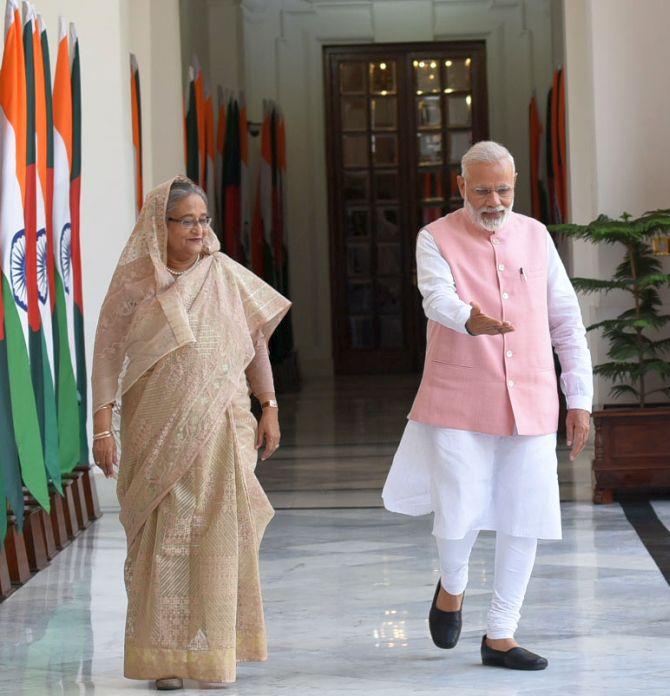
Two of South Asia's most prominent national figures have made critical remarks regarding India's Citizenship (Amendment) Act and related issues.
The criticism is striking not only because it is unprecedented, but both Bangladesh Prime Minister Sheikh Hasina and former Afghan president Hamid Karzai have nothing but goodwill toward India which has been their 'second home', and the sentiments behind their remarks are widely shared within India itself.
Sheikh Hasina has said (external link), "We don't understand why the Indian government) did it (CAA). It was not necessary." She said there is no "reverse migration" from India to Bangladesh, but, she added, "within India, people are facing many problems."
Sheikh Hasina duly acknowledged that '(Still], it is an internal affair. Bangladesh has always maintained that the CAA and NRC are internal matters of India. The Government of India, on their part, has also repeatedly maintained that the NRC is an internal exercise of India and Prime Minister Modi has in person assured me of the same during my visit to New Delhi in October 2019.'
Hamid Karzai's remarks during an interview with an Indian newspaper were somewhat nuanced.
He rejected the very notion behind the CAA: 'We don't have persecuted minorities in Afghanistan... the whole country is persecuted. We have been in war and conflict for a long time. All religions in Afghanistan: Muslims and Hindus and Sikhs... have suffered. The feeling in Afghanistan is very different to what the perception here in India may be... I hope that sentiment would be reflected in India as well with regard to other Afghans who are Muslim as well.'
In his characteristic way, Karzai hit the nail on the head, namely, that CAA takes a differentiated approach toward Muslims.
Such criticism does not arise out of 'misinformation' about the CAA or because of the 'false alarm' stemming out of the 'negative publicity generated by the anti-CAA protests in India', as apologists of the Indian establishment may interpret.
It is authentic and it signals that India's lurch toward Hindu nationalism has become a matter of concern to the Muslim nations in our region.
By pretending that we do not notice this happening in our neighbourhood, we can't wish it away.
In fact, Sheikh Hasina and Hamid Karzai are voices of moderation in their respective countries on issues of State and religion, while the majority opinion in Bangladesh and Afghanistan, two nations steeped in Islamic culture and heritage, may militate much more vociferously against the perceived persecution of Muslims in India.
Afghanistan, in particular, is actually in transition en route to an Islamic regime ruled by Shariah law, with the return of the Taliban to the power structure in a near future.
Anti-Muslim politics in India will cast a shadow on bilateral relations.
Statements such as by the Chief of Defence Staff General Bipin Rawat about "de-radicalisation camps" (external link) operating in India, have received wide attention regionally and internationally.
A cumulative impression is forming that Muslims are being persecuted in India.
India may churn out for Bangladesh a dozen community clinics and water treatment plants each, a National Knowledge Network here or a Vivekananda Bhavan there in Dhaka, but at the of the day, all that becomes a washout when we humiliate that country and rubbish its national honour and self-respect.
To add to it, there is a difficult history before and after Partition.
Just look at the humiliation our ruling elites are pouring at Bangladesh.
Dilip Ghosh, the Bharatiya Janata Party's president in West Bengal, has been quoted as saying on Sunday at Kolkata, 'Hindus were driven out of Bangladesh in their hundreds and thousands... On the other hand, the infiltrators are eating away our share of government benefits. We won't let the one crore infiltrators in Bengal live here. They didn't let us (Hindus) live on the other side of Bengal (Bangladesh) and they have no right to live in this part.'
Herein lies our dilemma.
Convincing Sheikh Hasina is going to be extremely difficult, well nigh impossible, because it entails convincing her that Prime Minister Modi and Home Minister Amit Shah are hollow men.
Sheikh Hasina is certainly not going to believe that.
She knows that Modi and Shah's impeccable records in power testify to their grit to only press ahead with their CAA-NRC project, which aims at exterminating the Bangladeshi 'termites' from Indian soil.
At any rate, as a savvy politician, Sheikh Hasina would know that the CAA-NRC project is integral to the Hindutva ideology, to which the BJP is staunchly committed.
Over and above, she cannot afford to be out of sync with the tide of public opinion in her own country about what is happening in neighbouring India.
The BJP ideologues (external link) don't get it that this is not about a failure of diplomacy.
This is actually about deeply flawed statecraft.
This will not be a mere tactical retreat.
It is heading toward a strategic defeat. The point is, the curtain is coming down on India's leadership role as a regional power even before the drama of the Asian Century truly began.
Can't you hear the catcalls from Gwadar to Hambantota to Chittagong to Kyaukphyu?
Indeed, there is a fundamental contradiction here: Hindutva ideology and the government's 'Neighbourhood First policy' are simply irreconcilable.
Let us not forget that Islam is the dominant religion in half of all South Asian countries -- in Afghanistan, Bangladesh, Pakistan and the Maldives -- while it is the third-largest religion in Sri Lanka and Nepal.
We can only overlook at great peril that Islam is the second-largest religion in South Asia with about 600 million Muslims, forming about one-third of South Asia's population.
Ambassador M K Bhadrakumar served the Indian Foreign Service officer for more than 29 years. He has served as India's ambassador to Turkey and Uzbekistan and has been a contributor to Rediff.com for well over a decade.
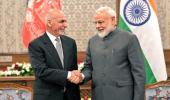
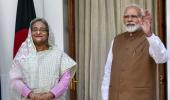
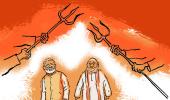
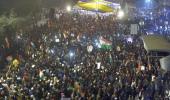
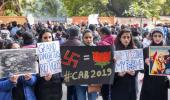






 © 2025
© 2025